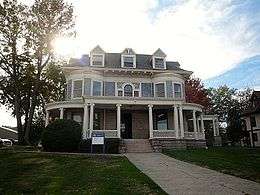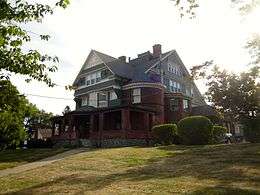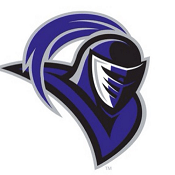University of Bridgeport
 | |
| Type | Private |
|---|---|
| Established | 1927 |
| Endowment | US $30,696,000[1] |
| President | Neil Albert Salonen |
Academic staff | 120 full-time |
| Undergraduates | 2,835[1] |
| Postgraduates | 2,007 |
| Location |
Bridgeport, Connecticut, USA |
| Campus | Urban 86 acres (350,000 m2)[1] |
| Colors | Purple and White |
| Athletics | NCAA Division II |
| Sports |
13 Varsity Teams[2] 8 women's; 5 men's |
| Nickname | Purple Knights |
| Mascot | Purple Knight |
| Affiliations | ECC |
| Website | www.bridgeport.edu |
The University of Bridgeport, commonly referred to as UB, is a private, independent, non-sectarian, coeducational National university[1] located on the Long Island Sound in the South End neighborhood of Bridgeport, Connecticut. The University is fully accredited by the New England Association of Schools and Colleges (NEASC-CIHE).[3] The University is known for its diverse student population, currently ranking as the tenth most racially diverse national university in the country by U.S. News & World Report.[4] The students of the University of Bridgeport are from 80 countries and 46 states.[5] In 2010, the percentage of students graduating that had participated in an English as a foreign or second language (ESL) program was one of the nation's highest at 5%.[6]
History
Connection to P. T. Barnum


The stately old Victorian homes on campus date from the late 1800s to early 1900s – many owned by family and friends of showman P. T. Barnum.[7]
Expansion and decline
The university grew rapidly in the 1960s by capitalizing on the increased number of people seeking to attend a U.S. college resulting from the baby boom, Vietnam War veterans eligible for a higher education under the G.I. Bill, and international students who wanted to attend college in the United States. Enrollment peaked at 9100 students in 1969, and an Ed.D. program in Educational Leadership was added in 1979.[8][9] Enrollment declined in the 1970s and 1980s after the waves of baby boom and Vietnam era veterans eligible for the G.I. Bill declined. By 1990, the university had cut tuition, room and board fees to $18,000 per year, but the school's reputation had not improved. More than a third of the 50 campus buildings were empty. To cut costs, the university decided to terminate 50 tenured faculty, and asked the other faculty to accept a 30% wage cut.[10] In addition, the university decided to eliminate its Liberal Arts College, alienating many students.[11][11] This led to the longest faculty strike in the history of American higher education. Dr. Greenwood, the president at the time, quit abruptly, and around 1,000 students left the school, contributing to the cash crisis.[12]
Financial assistance from the PWPA
In 1990, discussion began about affiliating or possibly merging the university with either the University of New Haven or Sacred Heart University.[13] The university was approached by the Professors World Peace Academy (PWPA), an affiliate of the Unification Church, but its offer to bail out the university was spurned by the trustees who said the school was "not going to have anything to do with the offer" and were concerned that such an affiliation would damage the university's reputation.[11][14][15]
Problems continued to plague the University; enrollment fell to 1,300 in 1991. Debt rose to over $22 million in 1991–92. Serious plans to merge the university with Sacred Heart fell through in 1992; the law school instead wanted to associate with Quinnipiac University, but Sacred Heart maintained that any takeover would have to include the Law School.[16] There were other universities willing to take over the school, but were unwilling to take on its debt.[14] The university's charter required the trustees to enter into "serious negotiations",[14] and they accepted the offer, giving the PWPA sixteen spots as trustees, constituting a majority.[17] The PWPA invested $50.5 million in the university on May 30, 1992,[18] enabling the university to keep its accreditation.
A two-year faculty strike, started in the midst of the university's financial troubles, intensified when the trustees gave control to the PWPA. Eventually, sixty-six professors and librarians agreed to a "divorce" with the university in return for compensation of up to a year's salary. In a similar move, the Law School decided to cut ties with the university,[17] separating from it. In order for the law school to remain open it had to merge with a financially sound university. The law school faculty and students voted to merge with Quinnipiac University and the name was officially changed to the Quinnipiac University School of Law.[17]
After the PWPA assumed control of the university, the trustees retained the president at the time, Dr. Edwin G. Eigel, Jr. (1932–2008). Eigel served as president until 1995. He was succeeded by distinguished professor and former PWPA president Dr. Richard L. Rubenstein, who served from 1995 to 1999.[19] Neil Albert Salonen, a member of the Unification Church, was the Chairman of the University's Board of Trustees when he was chosen to serve as ninth University president in 1999. He had earlier managed several Unification Church related organizations, and had served as President of the Unification Church of the United States from 1973 to 1980, and as Chairman of the International Cultural Foundation, prior to becoming the chief executive of the university.[20]
Since 2003 the University has been financially independent from PWPA after having received funding from the PWPA from 1992 until 2002. It has remained non-sectarian throughout.
21st-century growth
Enrollment has grown dramatically in recent years, from 1,383 total students in 1992 to 5,323 students in fall 2008. In 1991, the school added a Chiropractic Program, the first university-affiliated program of its kind in the U.S.[21] Additional doctoral programs in Naturopathic Medicine and Computer Science and Engineering were added in 1996 and 2006.[22][23] The Physician Assistant Institute matriculated its first class at the University in January 2011[24] In 2014, the school partnered with the Peace Corps to offer New England's first Peace Corps Preparatory Program.[25] At present the program has Accreditation-continued status with the relevant accreditor Accreditation Review Commission on Education for the Physician Assistant and its next review is 2020.[26]
Academics
In its 2012 rankings, University of Bridgeport placed in Tier 2 of National Universities, by U.S. News and World Report, with a 57.5% acceptance rate.[1] According to the university's website incoming students have an average GPA of 3.0, and an average SAT score of 1000 (Math and Verbal), 80% go on to get their masters.[27] In its 2006 annual college rankings, The Washington Monthly ranked University of Bridgeport 147th of all 245 National universities, with criteria based on research, community service, and social mobility.[28] The University of Bridgeport is fully accredited by the New England Association of Schools and Colleges. The University is also accredited by the Board of Governors of the Connecticut Department of Higher Education.[29]
Academic programs range from associate degrees in areas such as Business Administration and Dental Hygiene, to Bachelor of Arts, Bachelor of Fine Arts, and Bachelor of Science degrees in areas such as Accounting, Psychology, Graphic Design, Computer Science, Biology, Music, Computer Engineering, and International Business. The school also offers Masters and Doctoral programs in areas such as Counseling, Electrical Engineering, Naturopathic Medicine, and Education. UB also has adult and continuing education/distance learning programs on their main campus, as well as their Stamford and Waterbury branch campuses, with a total of 125 different programs of study.[30]
For undergraduates, as of 2004, the school has started an honors program that allows for the awarding of an honors degree upon graduation, if certain honors course requirements and academic standards (such as a cumulative grade point average of at least 3.0) have been maintained. The program also offers additional course options to students enrolled in the honors program.[31]
As of 2014 the university consists of thirteen schools, institutes and colleges:[32]
- School of Arts and Sciences
- Ernest C. Trefz School of Business
- College of Public and International Affairs (CPIA)
- School of Engineering
- Shintaro Akatsu School of Design (SASD)
- Fones School of Dental Hygiene
- School of Continuing and Professional Studies
- College of Chiropractic
- School of Education
- College of Naturopathic Medicine
- Acupuncture Institute (UBAI)
- Nutrition Institute
- Physician Assistant Institute (PAI)
- School of Nursing (In April 2014 the University of Bridgeport and Bridgeport Hospital announced an agreement to absorb the Bridgeport Hospital School of Nursing into the University, forming the University of Bridgeport School of Nursing.)
Best online degree programs by U.S. News & World Report
In its 2013 rankings, The Online Graduate Computer Information Technology Program at University of Bridgeport ranked #4 by U.S. News & World Report[33] and it was ranked # 1 in its 2012 rankings[34] while the online bachelor's degree program at UB ranked #12 by U.S. News & World Report, the ranking is based on factors such as graduation rates, indebtedness of new graduates, and academic and career support services offered to students.[35] Also, the online master in engineering degree program at UB has been placed as #16 by U.S.News & World Report in its 2013 rankings.[36]
Campus life
Athletics

The University of Bridgeport competes in NCAA Division II athletics and has 8 Women's sports, and 5 Men's sports.[37]
| Women's Sports | Men's Sports |
|---|---|
| Softball | Baseball |
| Basketball | Basketball |
| Cross Country | Cross Country |
| Swimming | Swimming |
| Soccer | Soccer |
| Gymnastics | |
| Volleyball | |
| Lacrosse |
In 2012, The University of Bridgeport women's gymnastics team won their fourth straight USA Gymnastics Collegiate National Championships.[38] Also, in 2013 UB women's gymnastics team won their fifth consecutive USA Gymnastics Collegiate National Championship.[39]
Campus safety
To address concerns of safety both on and off campus, the University has instituted a program where students are issued a portable alarm unit (PAL) that pinpoints their position and enables campus security to get to them in under two minutes. This system works immediately on the university campus, and in the neighborhood's surrounding campus. Further, the Campus Security Department has 40 unarmed personnel that provide security services 24 hours a day, with both on-foot and on bicycle patrols. The University has been the recipient of the Jeanne Clery Campus Safety Award.[40][41]
Traditions
University seal
Bridgeport's seal combines 4 core elements of its traditions and distinct character. In the upper left quadrant, the lamp of learning, which has been an element of the official Bridgeport's seal since 1931, is shown. In the upper right quadrant of the seal, the tree of life is shown, symbolizing personal and institutional growth. The lower left shows Bridgeport's seascape, illustrating the university's campus on Long Island Sound. The lower right quadrant shows the Perry Arch, representing tradition, solid foundations, and performance.[42]
Notable alumni
- Ellen Alemany, CEO, chairman and CFO of Citizens Financial Group. Alemany is presently the only female CEO of top 10 United States bank.
- Ivan Barbalić, Permanent Representative to the United Nations of Bosnia and Herzegovina
- Manute Bol, former professional basketball player, one of the best shot blockers in NBA history and one of the tallest people in the world.
- Julius Boros, former professional golfer, winner of 18 PGA Tour events
- Abdul Razaque, scientist, set world-record by producing the highest number of research articles during PhD(Computer Science and Engineering).
- Dave Weckl Acclaimed jazz drummer[43]
- Fred DeLuca, co-founder of the Subway franchise of sandwich restaurants
- George Dixon, former professional football player, collegiate football coach, and Canadian Football Hall of Fame member
- Kenichi Ebina, winner of America's Got Talent (season 8)
- Michael J. Jarjura, Mayor of the City of Waterbury, Connecticut
- Bill Smitrovich, an American actor.
- Lee Harry, an American director.
- John Rassias, linguist and Dartmouth faculty member
- Dennis Walcott, past Chancellor of the New York City Department of Education
Notable Faculty
- Robert V. Bruce, 1988 winner of the Pulitzer Prize for History
- Bill Finegan,
- James Shomate, pianist
- Igor Sikorsky, aviation pioneer
- Clark L. Wilson, psychologist
- John Worley, saxophonist
References
- 1 2 3 4 5 Best Colleges – US News & World Report
- ↑ University of Bridgeport – NCAA Official Athletics Site
- ↑ of Institutions - New England Association of Schools and Colleges: Commission on Institutions of Higher Education (CIHE)
- ↑ Best Colleges: Racial Diversity: National Universities – US News & World Report
- ↑
- ↑ Hopkins, Katy. (2011-12-20) 10 U.S. Colleges With Highest ESL Participation Rates - US News and World Report. Usnews.com. Retrieved on 2013-07-15.
- ↑ http://www.bridgeport.edu/welcome/locations/main-bridgeport-campus/
- ↑ Schaffer, Robert Illustrated History of Bridgeport NY: Wislow Publishing, 1992, p. 52.
- ↑ - UB history
- ↑ Davey, Robert "Moon Over Bridgeport" Connecticut Magazine (July, 1994), p. 69
- 1 2 3 Judson, George (November 27, 1991). "University To Eliminate Liberal Arts". The New York Times. The New York Times Company. p. B1. Retrieved October 6, 2009.
- ↑ Judson, George (December 24, 1991). "Bridgeport U. Nears Accord With Banks". The New York Times. The New York Times Company. p. B5. Retrieved October 6, 2009.
- ↑ Associated Press (December 8, 1991). "Merger of New Haven U. and Bridgeport Proposed". The New York Times. The New York Times Company. p. 63, Section: 1. Retrieved October 6, 2009.
- 1 2 3 Judson, George (April 17, 1992). "Making the Hard Choice at Bridgeport U.: Opting to Stay Alive". The New York Times. The New York Times Company. p. B5. Retrieved October 6, 2009.
- ↑ McQuiston, John (October 22, 1991). "U. of Bridgeport Refuses Aid From Moon's Group". The New York Times. The New York Times Company. p. B1. Retrieved October 6, 2009.
- ↑ Judson, George (January 17, 1992). "University of Bridgeport Plans Takeover by Sacred Heart". The New York Times. The New York Times Company. p. B4. Retrieved October 6, 2009.
- 1 2 3 Judson, George (August 13, 1992). "Bar Group Approves Transfer Of U. of Bridgeport Law School". The New York Times. The New York Times Company. p. B7. Retrieved October 6, 2009.
- ↑ The New York Times staff (May 30, 1992). "Bridgeport U. Closes Deal to Cede Control". The New York Times. The New York Times Company. p. 25, Section: 1. Retrieved October 6, 2009.
- ↑ Richard Rubenstein: A Brief Biographical Note
- ↑ Featuring Neil Albert Salonen in The American Chiropractor, July 30, 2005.
- ↑ Two decades and growing August 2011
- ↑ Public colleges lead state enrollment rise Connecticut Post November 19, 2008
- ↑ -University of Bridgeport History
- ↑ Physician Assistant Student Handbook: Academic Year 2011-2012. University of Bridgeport Physician Assistant Institute. October 2010. Page 5
- ↑
- ↑ "Accredited Entry-level Programs" . Accreditation Review Commission on Education for the Physician Assistant, Inc. July 27, 2012. Retrieved September 23, 2012.
- ↑ Quick Facts - University of Bridgeport
- ↑ "The Washington Monthly College Rankings" by The Editors. Washingtonmonthly.com. Retrieved on 2013-07-15.
- ↑ Accreditations and Memberships - University of Bridgeport
- ↑ -University quick facts
- ↑ -UB honors
- ↑ http://www.bridgeport.edu/academics/
- ↑ - UB CIT tanking
- ↑ -UB master online program
- ↑ -UB bachelor's degree program ranking
- ↑ -UB master's degree program ranking
- ↑ -Purple Knights Athletics
- ↑ -Purple Knights news
- ↑ -Purple Knights news
- ↑ Crime Report
- ↑ Jeanne Clery Campus Safety Award Recipients For 2003
- ↑ University of Bridgeport Student Handbook - Introduction
- ↑
External links
Coordinates: 41°09′57″N 73°11′28″W / 41.16586°N 73.19109°W